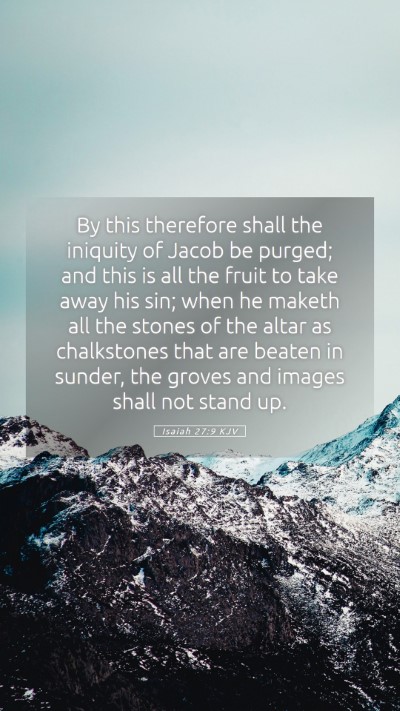Understanding Isaiah 27:9
Isaiah 27:9 states: "By this, therefore, shall the iniquity of Jacob be purged; and this is all the fruit to take away his sin; when he maketh all the stones of the altar as chalkstones that are beaten in sunder, the groves and images shall not stand up." This verse addresses the complicated nature of sin and redemption in the context of God's judgment and mercy.
Bible Verse Meanings
This verse highlights the process by which the people of Jacob (Israel) will come to repentance and experience purification from their sins. The figurative language indicates that the altars of idols will be removed, leading to a significant spiritual transformation.
Bible Verse Interpretations
According to Matthew Henry's commentary, this passage emphasizes that true repentance and the removal of idolatry is essential for the cleansing of sin. Albert Barnes provides additional insight, explaining that these actions signal a turning away from false gods, which is a prerequisite for receiving divine favor. Adam Clarke elaborates on this, noting that God's plan for restoration involves a shedding of old practices and a commitment to His ways.
Key Insights from Commentators
- Matthew Henry: Focus on repentance and the removal of idolatry as crucial steps in spiritual healing.
- Albert Barnes: Emphasizes that the cleansing of sin requires abandoning false worship and returning to God.
- Adam Clarke: Highlights the transformation process that follows genuine repentance and rejection of former sinful practices.
Understanding Scripture
In theological terms, this verse can be viewed as both a warning and a promise. The warning is that without true repentance, there is no cleansing of sin. The promise lies in God's assurance that He will restore those who turn back to Him. This duality is a recurring theme in Biblical exegesis.
In-Depth Scripture Analysis
To fully grasp the meaning of Isaiah 27:9, it is essential to consider the historical context. Isaiah prophesied during a time of great turmoil in Israel, where idolatry and sin were rampant. The need for a steadfast return to God's commands is evident throughout the Old Testament, making this verse particularly pertinent to the people of Israel.
Application of Bible Verses to Daily Life
The implications of this verse extend beyond the context of ancient Israel. For modern believers, it serves as a reminder of the importance of rejecting idolatry in various forms—be it money, power, or personal ambition. By diligently seeking a relationship with God, individuals can experience the purification and transformation that this scripture promises.
Bible Study Insights
For those engaged in Bible study groups or online Bible study, Isaiah 27:9 provides an excellent topic for discussion. It invites exploration into the nature of sin, the process of repentance, and God's forgiving character. Using Bible study tools can aid in deepening understanding, such as cross-references and commentaries.
Cross References
- Isaiah 1:18: Highlights God's willingness to reason with His people and cleanse them from their sins.
- 2 Chronicles 7:14: Emphasizes the condition for healing and restoration, calling for humility and prayer.
- Micah 7:18-19: Speaks to God's compassion and the ultimate forgiveness available to those who turn back to Him.
Conclusion
Isaiah 27:9 invites believers to reflect on their relationship with God, emphasizing that repentance and the renunciation of idolatry are crucial in experiencing His cleansing power. This verse serves as a vital part of scripture analysis and biblical commentary that teaches us how to interpret Bible verses effectively. By understanding such passages, individuals can cultivate a deeper faith and apply these teachings in tangible ways to their daily lives.


